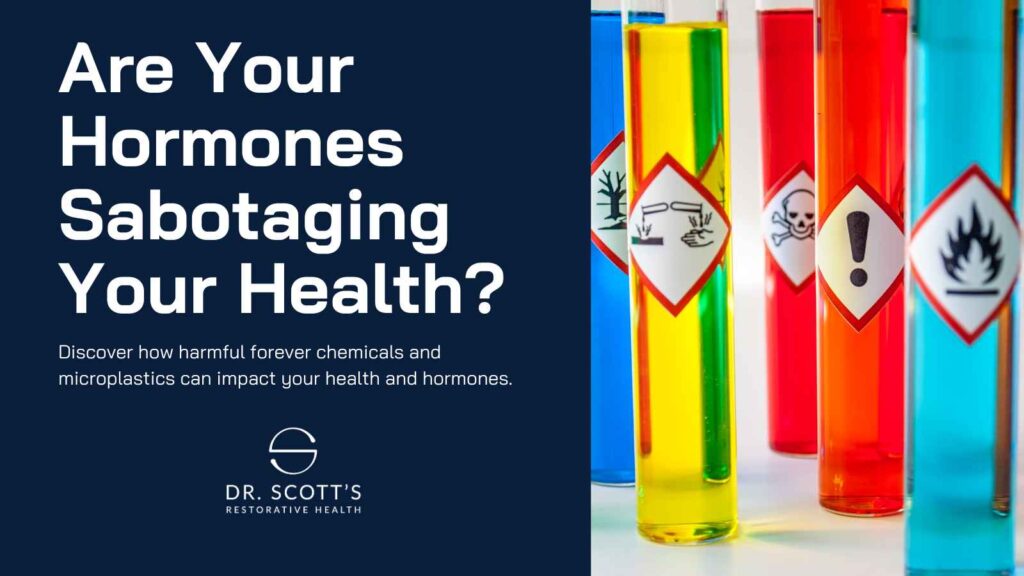Are Your Hormones Sabotaging Your Health? – Hormones are so essential for regulating various bodily functions, from metabolism to mood. Many young individuals, even those in their early 20s, are experiencing hormonal imbalances due to environmental toxins and lifestyle factors. Addressing these imbalances early can prevent more severe health issues down the line.
Are Your Hormones Sabotaging Your Health?

Top 10 Ways to Avoid Microplastics and Forever Chemicals
To help mitigate the impact of these harmful substances on your hormone health, consider the following tips:
- Use Glass or Stainless Steel Containers: Avoid plastic containers, especially for food and drinks. Glass and stainless steel are safer alternatives.
- Filter Your Water: Invest in a high-quality water filter that can remove microplastics and PFAS. Studies have shown that tap water can contain these harmful substances (Endocrine.org).
- Avoid Processed Foods: Processed foods often contain additives and are packaged in materials that can leach endocrine disruptors. Opt for fresh, whole foods instead.
- Choose Natural Cleaning Products: Many cleaning products contain harmful chemicals. Look for natural, non-toxic alternatives.
- Avoid Plastic-Wrapped Products: Reduce your use of plastic-wrapped products. Choose items with minimal or biodegradable packaging.
- Be Mindful of Personal Care Products: Many cosmetics and personal care products contain endocrine disruptors. Opt for products labeled as free from phthalates, parabens, and other harmful chemicals (ScienceDaily).
- Cook at Home More Often: Cooking at home allows you to control the ingredients and avoid exposure to harmful chemicals used in restaurant food packaging.
- Buy Organic Produce: Organic fruits and vegetables are grown without the use of synthetic pesticides and fertilizers, which can contain endocrine-disrupting chemicals. Click here for The 2024 Dirty Dozen, according to the EWG.
- Reduce Synthetic Clothing: Wear natural fibers like cotton, wool, and linen instead of synthetic fabrics that shed microplastics.
- Stay Informed: Keep up-to-date with research on endocrine disruptors and ways to minimize exposure. Awareness is key to making informed choices.
Hormones Sabotaging Your Health
For those seeking to live a healthier, chemical-free lifestyle, the Environmental Working Group (EWG) and Think Dirty are invaluable resources. EWG provides comprehensive databases, such as Skin Deep, which rates the safety of personal care products, and Food Scores, which evaluates the nutritional value and ingredient safety of various foods. Similarly, Think Dirty offers an app that allows users to scan product barcodes to receive detailed information about potentially harmful chemicals in personal care items. These tools empower consumers to make informed decisions and avoid products with toxic ingredients, promoting overall health and well-being.
Taking Control of Your Hormonal Health
Understanding the significance of hormones and the potential risks posed by environmental toxins underscores the need for regular hormone testing and lifestyle changes. You can order hormone testing labs here. Enclomiphene citrate offers a natural solution for restoring hormonal balance, making it an effective option for many.
Enclomiphene Citrate: A Natural Solution
Enclomiphene citrate is a promising treatment for regulating hormones, especially for those affected by endocrine disruptors like microplastics and forever chemicals. Unlike traditional hormone replacement therapies, enclomiphene citrate stimulates the body’s natural hormone production, making it a more natural treatment option. It is primarily used to treat male hypogonadism by increasing testosterone levels but has shown potential benefits for female hormonal imbalances as well.
Restore Your Health and Your Confidence! Schedule an appointment today.
At Doctor Scott’s, we are here to support you. Give us a call at 704-282-9355.
Please find Dr. Scott’s on Facebook and Instagram to keep up with our specials and offerings.
For more detailed information, you can read the study mentioned in the Journal of Clinical Endocrinology & Metabolism here (ScienceDaily) (Endocrine.org).





